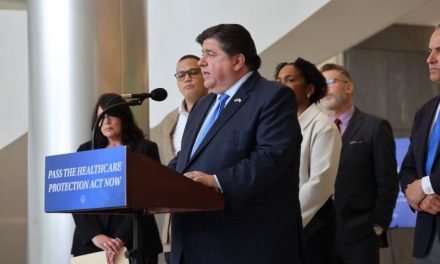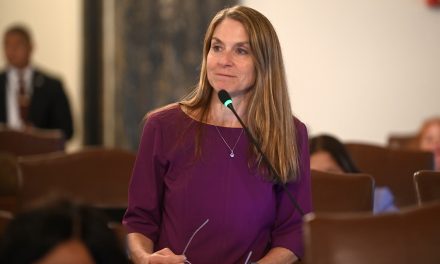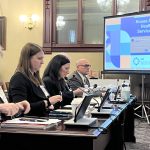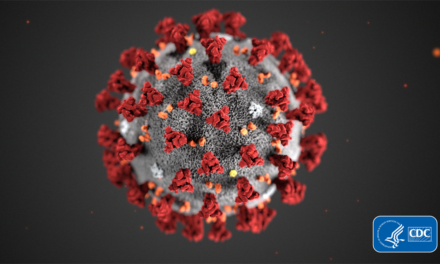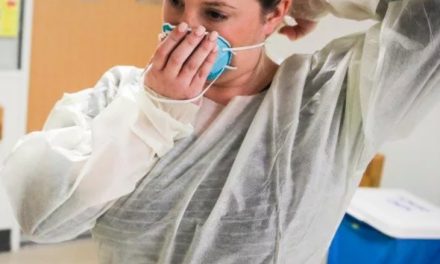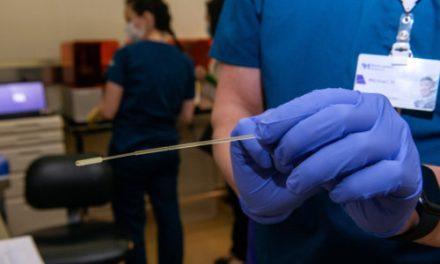
On the Record with Steve Nelson, CEO, Duly Health and Care
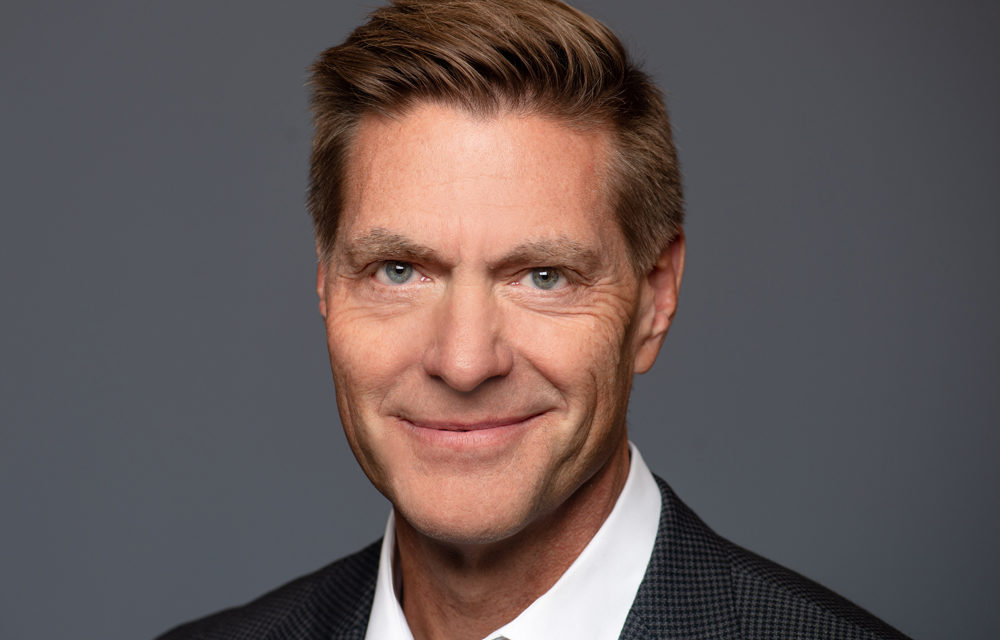
DuPage Medical Group is now Duly Health and Care.
This month’s name change comes as the organization aggressively expands its reach beyond Chicagoland, including the recent acquisition of South Bend Clinic and an announcement it was acquiring Quincy Medical Group.
“You should expect to see more of that,” said CEO Steve Nelson, a former executive at UnitedHealthcare and Henry Ford Health System.
During an interview with Health News Illinois, Nelson discussed what’s driving Duly’s growth, the company’s focus on technology and how a water ski accident is impacting his triathlon training.
Edited excerpts are below.
HNI: You are a five-time Ironman finisher. What are you training for these days?
SN: I have a half Ironman coming up in about six weeks I’m training for. And I’ve done a couple of races over the summer, including some 100-mile bike races. But, it’s been a little challenging because I fractured my ribs four-and-a-half weeks ago waterskiing, which is a passion that doesn’t get as much press – I love slalom waterskiing. But, looking at the calendar, I’m like I need to figure out how to train through this somehow, so I gave a little bit of time for them to kind of glue back together and then got back at it.
But, yeah, that’s a big part of me managing. One of the popular things, and rightly so, to talk about nowadays is burnout during this part of the pandemic. And part of my strategy to manage stress and show up the best version of myself as a leader is to take some time to be healthy and this is just a part of how I do that.
HNI: Why the name change? And how did you pick Duly Health and Care?
SN: It starts with this idea that we believe that there’s a different way to deliver healthcare and that healthcare in general does absolutely need to be reimagined. It’s too complicated. It’s a frustrating industry to work in for almost everybody. It’s behind other consumer-type industries for a lot of reasons. I came to DuPage Medical Group as a person who had three decades in healthcare and has a public health background and started my career in not-for-profit health systems like Intermountain Healthcare and Henry Ford Health System. And so I’ve had a different view and perspective as I’ve gone through my journey. And I came here because I thought that this multi-specialty, integrated, very collaborative, holistic approach to healthcare really had some legs to it. And as I looked at the results, and as I’ve now gotten to really know it over the past 14 months, I really do believe that it offers a platform and a foundation for the opportunity to deliver healthcare better and to get the results that we’ve been looking for, the experience we’ve been looking for, to minimize physician burnout and create a better place to do doctoring, as well as a better place to be a patient.
I start with that premise. And if you say, ‘OK, well there ought to be more access to this,’ that means we need to be in more locations than Chicagoland and particularly DuPage County. And so the name felt limiting to what we were trying to do, not notwithstanding the great legacy.
So, as we looked for a new name we were on a quest for a real word that actually meant something that we can own. It’s very difficult to find that, but we were very fortunate to come across the word ‘duly,’ which, if you look it up, it’s kind of an old word used in legal and political circles, mostly. It means proper, intentional, done the right way with care. And it has kind of a seriousness to it, which feels very connected to what we’re trying to do. And then the idea of separating the word healthcare to health and care also is a very interesting way to think about how we think we should be thinking about healthcare. Meaning you don’t always need care. Sometimes you need somebody to help you think about your health. And sometimes you need care …
A couple other things, it does allow for a bit of a nod to DuPage, so ‘duly,’ the ‘du.’ And then ‘du’ in Latin means to. So, partnerships between patients and physicians. There’s a bunch of levels to the name, and we’re super excited about it. It allows, we think, the opportunity to recommit to really reimagining the healthcare experience, and then providing just tremendous access to that for both doctors and patients.
HNI: In the past month, you closed on the acquisition of the South Bend Clinic and announced you were buying Quincy Medical Group. What’s driving this aggressive growth?
SN: It connects very much to the idea of creating more access to both doctors and patients in this model of an integrated, holistic approach to healthcare. We’re untethered to a hospital or to a payer. And South Bend Clinic and Quincy Medical Group both have similar DNA, where it’s an independent and collaborative, multi-specialty approach to healthcare, which I personally am convinced is the right way to deliver healthcare. And so when we run across like-minded organizations, it seems very natural to join forces to continue to expand.
South Bend Clinic has great leadership, incredible physicians practicing great care in a very close but different market than Chicagoland. And so they’re a very natural partnership and we immediately felt like family. And then same with Quincy Medical Group, just an opportunity to expand the platform for both better doctoring and better patient care. So that’s what’s driving it. I would say you should expect to see more of that. Both physician growth within Chicagoland, in addition to partnerships with groups like Quincy Medical Group and South Bend Clinic outside of Chicagoland and outside of Illinois.
HNI: Are there specific groups you are already talking to, or certain geographic markets that you are targeting?
SN: Too early to get into any kind of details, but let’s just say there’s a lot of interest in what we’re doing, and we have a lot of interest in what others are doing. And so there’s a lot of very natural and easy and logical conversations that have come about and will continue to happen. I’ll just say since I’m in Chicago and winter’s coming, I’m super interested in talking to people in better weather places! But there’s no specifics I can share at this time.
HNI: Where do you see Duly in the next three to five years?
SN: Well, one thing I didn’t mention that I think is the driving force behind all of this is with our name came a purpose statement, and that’s ‘helping humans flourish.’ And if you think about how do you help humans flourish, and you really sort of get into, ‘OK, what would be the tactics that would help you do that?’ Then it is easy for me to talk about why this thing is pretty compelling and how it’s going to look into the future. First, we have to help ourselves flourish. So this has to be a place where people can do their best and greatest work. I think you’re going to see in three to five years, even this week, a better place to work. So, better culture, better opportunities for development, technology that doesn’t get in your way but actually helps you do your job better, opportunities to have access to things that help your health and help you flourish …
Second, there’s a lot of conversation about tech. I was looking back at an interview I did five or six years ago when I was at UnitedHealthcare about digital technology and healthcare and I remember saying, ‘I think digital will become synonymous with healthcare.’ And I really do think you will see that here, where tech cannot be the answer, it has to be the enabler. And people are going to feel like it’s a different experience because of technology. Technology, right now in some ways if you ask a physician, they are like, ‘Hey, I’m so busy dealing with my technology and keystrokes and everything that I can’t actually make eye contact with my patient.’ That’s not the right answer. We think technology, whether it’s artificial intelligence, machine learning or how a physician engages with patients, all these things are going to look different because of the technology we bring. I’ll give you one very small but super important example. Three years from now, you will not see a clipboard in any of our clinics. When you walk in and someone gives you a clipboard and says, ‘Can you fill out this information?’ That is not going to happen. We can’t get rid of those things fast enough.
Then, I would say, if we do our jobs right, the way that you navigate healthcare is going to look and feel a lot different. It’s very common for a person to come into a clinic setting and sit in a waiting room and listen to a podcast, order things on Amazon, do their homework, check with their kids’ school, all while they’re waiting for this physician in this very archaic kind of a system. Do we have to go to a physical location? Televisits between 2018 and 2019, I think we did something like 1,500, maybe 2,000 televists. This year, so far, and we’re sitting here in September, we’ve done over a quarter million. The world is changing. We are going to drive that and push that hard. Not only do you have the opportunity to use technology in a way to have a different kind of visit. But how about accessing specialists and having behavioral health conversations while you’re sitting there in a primary care doctor’s office on the flat screen on the wall? Just dial up the orthopedic surgeon, dial up the behavioral specialist and let’s talk about what’s going on, all together. These are the kinds of things that you’ll see.
And, I think lastly, we’ll definitely be in more places.
HNI: Some provider organizations saw a big acceleration in telehealth during the beginning of the COVID-19 pandemic, but then, at least in certain specialties, that dipped back down. Have you continued to see a sustained, increased level of telehealth?
SN: I think the natural course would be, if you just left it to its own devices, it would drop off a bit – not all the way back, because there’s been some new muscles developed. And, obviously the payer dynamics and policy and political support are all moving in the positive direction for televisits and telehealth. But, if you leave it to its own course, I think it’ll drop off naturally or kind of come back. We are committed to not allowing that to happen because we have this window, this opportunity where expectations are changing. And so we want to accelerate that and not let it drop back. And so like I said, not only using it for the initial visit, but consultations and other kinds of opportunities to navigate health in a new way.
HNI: This summer, you notified nearly 600,000 patients that their personal information may have been compromised during a July cyberattack. As you embrace new technologies, how do you balance these increased security risks and also take into account fear from some patients about their privacy?
SN: It’s a really important question. I think the answer is to further invest and further embrace technology, not to shy away from it. We’re really proud of how we responded to these cybercriminals who are going after healthcare. It’s a true reality that we have to deal with and be prepared for. And we handled that situation well and came through it. But we are incredibly determined to keep patient information safe, to continue to use technology in ways that can help doctors be better doctors and patients have a better experience. So we’re going to boldly continue, but at the same time be incredibly diligent about protecting patient information.
HNI: How has the pandemic impacted Duly from a financial standpoint?
SN: There’s been twists and turns, but overall we’ve remained in a very strong financial position. Our balance sheet is healthy. Our top line growth is compelling, and our ability to react and be nimble and manage costs appropriately, all while investing in our business and rewarding our folks for working hard. And so, we feel like we’ve been able to manage all that. The very good news about our organization is we came into the pandemic in a strong position, and we all worked together hard to maintain that strength.

